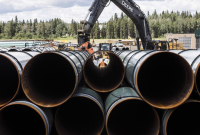Support strong Canadian climate journalism for 2025
The Trudeau government and the petrobloc (the fossil fuel industries and their political, financial and media allies) would like you to believe that the expansion of the Trans Mountain pipeline (TMX), intended to triple the flow of diluted bitumen from the Athabasca Sands to the port of Vancouver, is a done deal.
But the latest approval of TMX by the Trudeau government and the industry-friendly National Energy Board does not settle the issue.
There are significant legal challenges from six major First Nations whose territories include much of the proposed pipeline route through B.C. Ecojustice is litigating in the Federal Court of Appeal to defend the critically endangered southern resident orcas. The B.C. government is taking its case for jurisdiction over the transport of diluted bitumen within B.C. to the Supreme Court.
The Indigenous-led, grassroots place-based resistance that encouraged the Texas-based multinational Kinder Morgan (founded by two former Enron executives) to walk away from the project, is re-emerging, after the construction delay imposed by the Federal Court of Appeal in August 2018.
And the federal election in October could give the balance of power to two parties – Greens and New Democrats – which are opposed to the pipeline.
Now, a new front has opened up: a national campaign to halt fossil fuel subsidies on which projects like TMX depend.
B.C. residents in the sacrifice zones of the pipeline project know of its local, regional and global environmental risks, from tank farm fires, pipeline rupture, oil tanker spills and orca deaths, to intensified planetary heating. These concerns didn't always resonate with Canadians elsewhere, facing economic insecurity and public service cutbacks.
But the federal government's 2018 purchase of the pipeline has added an enormous new risk to Canadian taxpayers. While the petrobloc touts TMX as a route to economic prosperity, taxpayers may see more pain than gain.
Buying the pipeline alone cost taxpayers $4.4 billion, far more than analysts said it was worth, with a further nine to 12 billion dollars needed for expanding its capacity, locking Canada further into planet-heating infrastructure while creating far fewer permanent jobs than investment in renewable energy.
Independent analysts like Andrew Nikiforuk and J. David Hughes argue that optimistic pro-pipeline estimates of Asian demand for Canadian bitumen downplay such factors as escalating construction costs, the completion of two other pipelines by 2022, high transportation costs, alternative supply sources and lower-quality product.
“Trans Mountain has been losing money since Ottawa overpaid for it, leaving taxpayers on the hook,” economist Robyn Allan told me. “Revenues from tolls on the existing line are insufficient to cover all the interest expense or any of the principal amount the government borrowed to finance the acquisition of the 66-year-old pipeline. Billions more in taxpayer-funded subsidies will be required to finance the expansion since shipper tolls will not cover the cost of building it."
This is why Kinder Morgan walked away: capital costs were too high and Trans Mountain’s expansion ceased to be commercially viable. Any reasonable cost-benefit analysis reveals that there are no net economic benefits from the expansion, either, and the obvious environmental costs are staggering.”
So why did the feds bail out such a toxic investment?
A senior researcher at Alberta's Parkland Institute told me that TMX has become a political symbol. Serious climate action means ending fossil fuel subsidies (as Trudeau promised in 2015) and investing directly in sustainable energy and infrastructure.
Yet Canadian governments continue to pour about $3.3 billion annually (according to the International Institute of Sustainable Development) into direct support for an industry whose business model entails knowingly jeopardizing the habitability of the planet. That amount would fund job retraining for 330,000 workers, including in greener industries with potential for exporting technology and energy.
A recent IISD recent report pegs Ontario's subsidies alone at $700 million over the last year, equivalent to health-care costs for 189,000 Ontarians.
“Spending money on fossil fuel encourages their use, increases pollution and hinders efforts to transition to a clean economy,” the report says. “These forms of subsidies ultimately incentivize investment in and use of fossil fuel infrastructure, creating long-term fossil fuel 'lock in' for Ontario’s communities.”
Direct handouts are a small part of a much bigger picture. The International Monetary Fund adopts a broader definition of “subsidy” to include the untaxed externalized costs of energy use, including air pollution, traffic congestion and climate disruption. (One could add the cleanup costs of abandoned gas and oil wells, which the Alberta energy regulator has estimated at $47 to 70 billion.)
In 2015, the IMF estimated global subsidies to fossil fuels at a stunning $4.7 trillion annually (6.5 per cent of global GDP), including $58 billion from Canada, making coal, oil and gas companies arguably the world's biggest corporate-welfare recipients. Projects like TMX limp along on such subsidies.
To be sure, in a twist on colonialist divide-and-rule tactics, the Trudeau government hopes that Indigenous groups will buy a big chunk of TMX. Dressed up as “reconciliation,” that strategy means dumping the liability for such a risky project (including monthly interest payments of $20 million or more) onto First Nations, as Indigenous economist Winona LaDuke has put it.
Moreover, it doesn't change the government's obligation to obtain consent from those Nations whose territory is directly affected.
Since spring 2018, TMX has been truly “nationalized.” Economically, in that Canada's government owns the pipeline and taxpayers subsidize it. Politically, in that, after multi-million-dollar propaganda campaigns by the Alberta government and industry associations, TMX has become a wedge issue in national politics.
Symbolically, in that Trudeau continually presents TMX as in the “national interest,” a claim echoed by petro-elites in Alberta. The West Coast-based groups opposing TMX were not well-positioned to challenge that triple nationalization. But a challenge is emerging on all three fronts.
Politically: a call for a Green New Deal (investment in renewable energy, green jobs and a phase-out of fossil fuels) is resonating across Canada and influencing federal party platforms.
Economically: an emerging national campaign to end subsidies to fossil fuels and divert them to renewable energy, with potential for the export of both energy and technology. In 2015, Trudeau promised to end fossil fuel subsidies, and didn't. In 2018, Conservative Leader Andrew Scheer promised the same. The campaign aims to hold such politicians to account.
Symbolically: the resistance is challenging the petrobloc’s definition of the “national interest,” as the breakneck export of Canadian resources (and refinery jobs) at bargain-basement royalty rates, accelerating global heating that is already toasting Canada at twice the average global rate, and ignoring the failure of Canada, almost alone amongst advanced economies, to build a strategic oil reserve against international supply disruptions,
The petro-nationalist definition of Canada, as implicitly an extractivist entity that treats the world's atmosphere as a dumping ground, is being challenged by an aspirational vision of what Canada could be. That vision celebrates Canada's many progressive achievements, from medicare to multiculturalism, but also acknowledges its secret history of violence to workers, Indigenous peoples and the land that colonialism and extractivism have entailed.
Instead, as professor Shane Gunster has argued, we can build a country “more in keeping with the values of democracy, equality, justice, diversity, compassion and sustainability – values that so many Canadians continue to hold as the true measure of who we are and what we do.”
One way to actualize those values is to stop giving corporate welfare to an industry that was hard-wired into the previous century’s global economy, but that must be phased out as quickly as possible to give humanity a fighting chance.
Bob Hackett is a Professor Emeritus of Communication at Simon Fraser University, a Burnaby-based climate and coast defender, and co-author of Journalism and Climate Crisis: Public Engagement, Media Alternatives.






Comments
Such an excellent analysis, thank you for writing. I shared it with my network in New Brunswick and it's being shared now by groups across the province. Environmental activists here are watching closely the developments on the West Coast as here in the East we have many pipeline-boosters waiting for the opportunity to re-open the Energy East discussions.
Encouraging to hear that the fight is not over. Here in Alberta some people talk as if it's over. But if we give up our time on this planet may be nearly over.
Cities across the nation are declaring a climate emergency. Indeed the day before approving the TMX pipeline Parliament passed such a bill. Stopping the TransMountain pipeline expansion would provide a powerful synergy with the nation’s GHG reduction goals. ECCC reported this spring that industry routinely under-reports GHG emissions from the oil-sands. Canadian tax payers subsidize this deception as well.
The issues raised by Dr. Hackett including indigenous rights, voodoo economics of the petrobloc, and their corporate welfare are critically important. So are unaddressed health impacts of the project. In April, the Health Officers Council of BC (HOC) sent a letter to Premier Horgan pointing out that the health impacts of the expansion project have not been adequately assessed including impacts from climate change or a large spill in Burrard Inlet. The National Energy Board brushed off the former as irrelevant and the latter as impossible and Cabinet reapproved the project. In the national interest tax payers should join the HOC in demanding an independent, comprehensive health impacts assessment of TMX. Such an assessment would reveal the reckless approach the NEB has taken regarding the health threats from the project and likely stop it if we could get the government blinders off.
It was over 40 years ago David Lewis, then leader of the NDP, coined the campaign slogan "corporate welfare bums." Then there's that figure, $4.7 trillion a year globally in subsidies to fossil fuels. We keep hearing how the fossil fuel habit is so hard to break because it's such cheap energy. But how cheap is it if it takes that much money every year to keep it going?
A brief history of Canada, from long before it was Canada:
Big Hudson's Bay Company business, backed by big government, with big plans, big money on the line, in a big hurry, so Indians have to either join the exploitation or knuckle and make way.
Fast-forward to now: Big fossil-fuels business, backed by big government, with big plans, big money on the line, in a big hurry, so First Nations have to either join the exploitation or knuckle and make way.
We're so dazzled by modern technologies and the needs they create, be it 17th-century felt hats or 21st-century fossil-fuel-guzzling lifestyles, that we're blinded to our utter, complete lack of progress in learning how to live on the planet without abusing it and anyone who gets in the way.